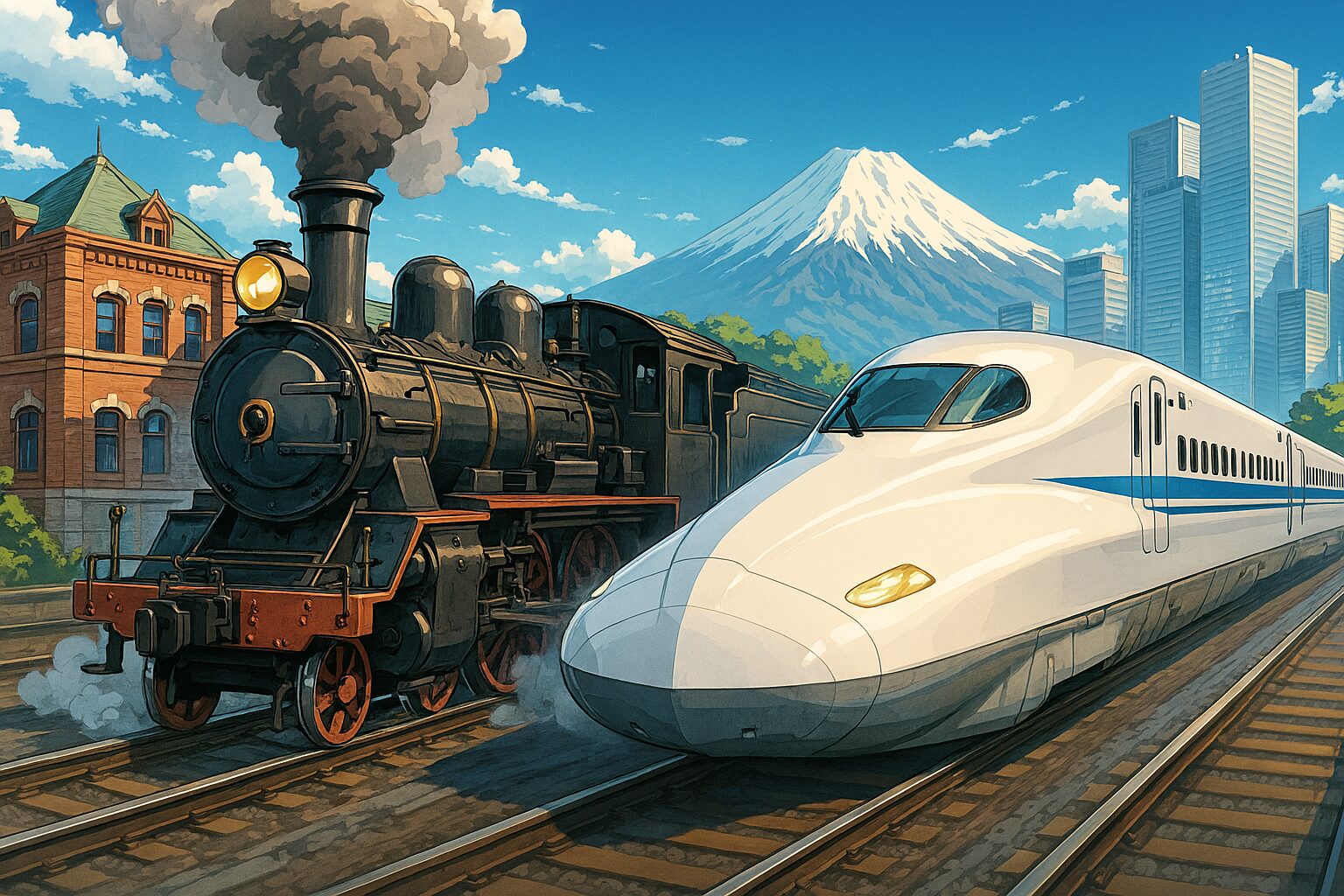① What is October 14th? Detailed Introduction to History and Culture
October 14th is “Railway Day” (Tetsudo no Hi), commemorating the opening of Japan’s first railway. This day was originally established as “Railway Memorial Day,” but was renamed “Railway Day” in 1994 by the Ministry of Transport (now the Ministry of Land, Infrastructure, Transport and Tourism). Its origins trace back over 150 years to October 14, 1872 (September 12, Meiji 5, in the old lunar calendar).
On this date, Japan’s first full-scale steam locomotive commercial operation began between Shimbashi (later Shiodome) and Yokohama (now Sakuragicho). This railway was a national project incorporating the latest technology of the time, symbolizing Japan’s modernization and “Bunmei Kaika” (civilization and enlightenment). The grand opening ceremony was attended by Emperor Meiji, marking a significant turning point in Japanese history.
At that time, Japan had opened its borders and was rapidly building the nation to catch up with Western powers. The railway was not merely a means of transportation; it was introduced as a “tool of civilization” to rapidly transport people, goods, and information, spurring economic development and a shift in national consciousness. The technology was primarily imported from the UK, and the nation mobilized many engineers and skilled workers to absorb the know-how.
The choice of October 14th for “Railway Day” has a somewhat complex history. While the 14th of October corresponds to the 12th of September in the old lunar calendar, October 10th (the date of a later ceremony) was long celebrated. However, in respect for the more accurate historical event, the date was officially changed to October 14th. This change itself speaks to the deep respect for Japanese railway history and the culture of valuing historical verification.
Even today, Japanese railways boast world-class safety, punctuality, and technological prowess. The high-speed rail network, exemplified by the Shinkansen, spans the country, and urban commuter trains run with such precision they are often said to have “no deviation of even a second.” Local lines, meanwhile, blend into the beautiful scenery and culture of their regions, becoming an indispensable part of people’s lives. “Railway Day” is a time to honor the great achievements of these predecessors and pass on the technology and spirit to the future.
② Cultural Connections Deciphered from “Railway Day”
“Railway Day” celebrates not only a past event but also reveals several key elements that form the very foundation of Japanese society and culture.
1. The Culture of Punctuality (Teijisei)
The “punctuality” of Japanese train operation is world-famous. The sight of a conductor deeply apologizing for even a slight delay may seem astonishing to foreigners. This extreme precision is deeply linked to the Japanese cultural value that “respecting time is showing consideration for others.” The railway supports the rhythm of life for countless people, and its accuracy is built on the overall trust and discipline of society. This “punctuality” permeates every aspect of Japanese business and daily life, becoming a major factor in the country’s international credibility.
2. The Spirit of “Omotenashi” and the Pursuit of Service
Japanese railways do not just transport people; they offer an extremely high standard of service. The perfectly clean carriages, the polite in-car announcements, and the abundance of unique sightseeing trains (Cruise Trains) are manifestations of the “Omotenashi” (wholehearted hospitality) spirit.
For example, the Shinkansen cleaning teams are known for the “7-minute miracle,” perfectly tidying up the carriage during a brief stop. Furthermore, railway companies constantly strive to delight passengers with Ekiben (station boxed meals), commemorative goods, and limited-time operations, seeking to make the travel experience itself valuable.
3. Technological Innovation and the Craftsman’s Spirit
The history of Japanese railways is one of relentless technological innovation. From steam locomotives to electric trains, and the development of the world’s fastest class of Maglev trains, Japan has consistently challenged the cutting edge of technology. This behind this lies the Japanese craftsman’s (shokunin) commitment to “Monozukuri” (manufacturing/making things) and an unwavering belief in absolute safety. This serves as a major pillar demonstrating Japan’s engineering excellence to the world.
4. Coexistence with Local Communities
Despite facing modern challenges like depopulation, local lines (rural railways) survive by integrating with the local landscape and cultural heritage. Many rail fans (known as “Tori-tetsu” or “Nori-tetsu”) visit these lines to experience the region’s history and atmosphere. The fact that the railway serves not only as a means of transport but also as a guardian of local culture symbolizes Japan’s cultural diversity.
③ A Question for the Reader
After reading this article, have you felt that the Japanese railway is more than just transportation infrastructure, holding deep historical and cultural significance?
If you ever have the opportunity to visit Japan, take a railway journey. Ride a train that runs with extreme accuracy, savor the artistic Ekiben sold at the station, and gaze at the beautiful scenery flowing past the window.
To you, what does the act of “keeping time” mean? If the same “punctuality” as the Japanese railway were achieved in your country, how do you think people’s lives and consciousness would change?
Please share your thoughts on this article, your expectations for Japanese railways, or the most memorable railway journey you’ve experienced in the comments below.
④ Useful External and Internal Links
- Information on Japanese Railways (External Link – Ministry of Land, Infrastructure, Transport and Tourism)
MLIT Information on Railways - Promoting the Appeal of Railways by JR Group (External Link)
JR Group TRAIN TRIP - Introduction to Japanese Sightseeing Trains (D&S Trains, etc.) (External Link – JR Kyushu)
JR Kyushu D&S Trains - Related Internal Articles from the “What’s Today’s Special Day” Series
KIRI53.com “What’s Today’s Special Day” Series List
10月14日「鉄道の日」 – 日本の近代化を支えた鉄路の物語
①10月14日は何の日? 歴史と文化の詳細な紹介
10月14日は、日本で初めて鉄道が開業したことを記念する「鉄道の日」です。この記念日は、もともと「鉄道記念日」として制定されましたが、1994年に運輸省(現・国土交通省)の主導で「鉄道の日」と改称されました。その起源は、今から約150年以上前の1872年10月14日(旧暦:明治5年9月12日)にさかのぼります。
この日、新橋(後の汐留)と横浜(現・桜木町)の間で、日本初の本格的な蒸気機関車による営業運転が開始されました。この鉄道は、当時の最新技術を取り入れた国家的プロジェクトであり、日本の近代化と文明開化の象徴となりました。明治天皇の御臨席のもと盛大に開業式が執り行われ、日本の歴史における重要な転換点となったのです。
当時の日本は、鎖国を解き、欧米列強に追いつくため、急ピッチで国づくりを進めていました。鉄道は、単なる交通手段ではなく、人、物資、そして情報を迅速に運び、経済発展と国民の意識改革を促す「文明の利器」として導入されました。技術は主にイギリスから導入され、多くの技術者や熟練工が国を挙げてそのノウハウを吸収しました。
「鉄道の日」が10月14日であることには、実は少し複雑な経緯があります。旧暦の9月12日が新暦の10月14日にあたりますが、後に開業式典が開催された10月10日が長らく記念日とされていました。しかし、より正確な歴史的事実を尊重し、現在の10月14日へと改められました。この変更自体が、日本の鉄道史に対する深い敬意と、歴史の検証を大切にする文化を物語っています。
現代においても、日本の鉄道は世界最高水準の安全性、定時運行、そして技術力を誇ります。新幹線に代表される高速鉄道網は国土を縦横に結び、都市部の通勤電車は「一秒の狂いもない」と言われるほどの正確さで運行されています。また、地方のローカル線は、その地域の美しい風景や文化に溶け込み、人々の生活に欠かせない足となっています。この「鉄道の日」は、そのような偉大な先人たちの功績を称え、未来へ技術と精神を継承していく日なのです。
②「鉄道の日」から読み解く日本文化との関連性
「鉄道の日」という記念日は、単に過去の出来事を祝うだけでなく、日本の社会や文化の根幹をなすいくつかの重要な要素を私たちに教えてくれます。
1. 時間厳守の文化(定時性)
日本の鉄道運行の「定時性」は世界的に有名です。数分の遅延でも車掌が深くお詫びをする姿は、外国人から見ると驚異的に映るかもしれません。この極度の正確さは、「時間を守ることは他者への配慮である」という日本文化の価値観と深く結びついています。鉄道は、多くの人々の生活のリズムを支えており、その正確さは、社会全体の信頼と規律の上に成り立っています。この「定時性」は、日本のビジネスや日常生活のあらゆる側面に浸透しており、国際的な信頼を得る大きな要因ともなっています。
2. 「おもてなし」の精神とサービスの追求
日本の鉄道は、単に人を運ぶだけでなく、極めて高い水準のサービスを提供します。清掃の行き届いた車両、丁寧な車内アナウンス、そして多様なニーズに応える観光列車(クルーズトレイン)の充実ぶりは、「おもてなし」の精神の現れです。
例えば、新幹線の清掃チームは「7分間の奇跡」として知られ、短い停車時間で完璧に車内を整備します。また、鉄道会社は駅弁、記念グッズ、限定運行など、乗客を楽しませるための工夫を常に凝らしており、移動体験そのものを価値あるものにしようと努めています。
3. 技術革新と職人の精神
日本の鉄道史は、絶え間ない技術革新の歴史でもあります。蒸気機関車から電気機関車、そして世界最速レベルのリニアモーターカーの開発に至るまで、日本は常に最先端の技術に挑戦してきました。この背後には、「ものづくり」(モノづくり)に対する日本の職人的なこだわりと、安全性を絶対に譲らないという強い信念があります。これは、日本の工学分野における優秀性を世界に示す大きな柱となっています。
4. 地域社会との共存
地方のローカル線は、過疎化や人口減少といった現代的な課題に直面しながらも、地域の風景や文化遺産と一体化して存続しています。多くの鉄道ファン(「撮り鉄」「乗り鉄」などと呼ばれます)が、その地域の歴史や風土に触れるためにローカル線を訪れます。鉄道が単なる移動手段ではなく、地域文化の守り手としての役割も担っていることは、日本の文化的な多様性を象徴していると言えるでしょう。
③読者への問いかけ
この記事を読んで、日本の鉄道が単なる交通インフラ以上の、深い歴史と文化的な意味を持っていることを感じていただけたでしょうか?
もしあなたが日本を訪れる機会があれば、その鉄道の旅で、極めて正確に運行される電車に乗り、駅で販売されている芸術品のような駅弁を味わい、窓外に流れる美しい景色を眺めてみてください。
あなたにとって、「時間を守る」という行為は、どのような意味を持ちますか?もしあなたの国で、日本の鉄道のような「定時運行」が実現したら、人々の生活や意識はどのように変わると思いますか?
ぜひ、この記事を読んだ感想や、日本の鉄道に対するあなたの期待、あるいはあなたが体験した最も印象的な「鉄道の旅」について、コメントで教えてください。
④参考になる外部リンク、内部リンク
- 日本の鉄道に関する情報(外部リンク – 国土交通省による)
国土交通省 鉄道に関する情報 - JRグループによる鉄道の魅力発信(外部リンク)
JRグループ TRAIN TRIP - 日本の観光列車(D&S列車など)の紹介(外部リンク – JR九州)
JR九州 D&S列車の旅 - 「今日は何の日」シリーズの関連内部記事
KIRI53.com 「今日は何の日」シリーズ一覧



コメント